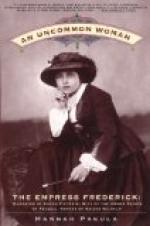“You would not have many to confess,” said Elizabeth, “for your sins are few. You are the pride of my court, and, as I am told, a true pattern of all knightly virtues. Remain so, and who knows, my fair young count, what the future may bring you? Love my Natalie now only as an angel of innocence; let her grow up as such, and then—”
“And then?” asked the count, as the empress stopped.
“Then we shall see!” smilingly responded Elizabeth. “But now hasten forward to announce us.”
“Your majesty forgets that, to enable one to penetrate into this enchanted castle, your written command is required!”
“Ah, that is true!” said Elizabeth, stepping to her writing-table. This time she was not too indolent to write; no representations nor prayers were needed. It concerned the seeing of her daughter—how, then, could she have thought writing painful or troublesome?
With the same pen with which, a short time before, she had so unwillingly signed the congratulatory letter, she now wrote upon a sheet of paper, provided with her seal these words:
“The Count Rasczinsky may be admitted.
“ELIZABETH.”
She handed the paper to the count, who pressed it to his lips.
“You can retain this paper for all time,” said the empress, as she dismissed him. “I know that I can wholly confide in you. You will never sell or betray my Natalie?”
“Never!” protested the count, taking his leave.
Hastily mounting his horse, he galloped through the streets, and when, having left the city behind him, he found himself in the open country where no one could observe him, he drew the paper Elizabeth had given him from his bosom, and waving it high in the air, shouted:
“Good fortune, good fortune! This paper is my talisman and my future! With this paper I will give Russia an empress, and make myself her emperor!”
PRINCES ALSO MUST DIE
Yes, even princes must die, glorious and lofty as they are, proudly as they stand over their trembling subjects! Even to them comes the dark hour in which all the borrowed and artistically-combined tinsel of their lives falls from them; a dark hour, in which they tremble and repent, and pray to God for what they seldom granted to their fellow-men—mercy! Mercy for those false tales which they have imposed upon the people, for those false tales of the higher endowments of princes, of inherited wisdom which raises them above the rest of mankind—mercy for their arbitrariness, their pride, and their insolence—mercy for a poor beggar, who, until then, had called himself a rich and powerful prince.
And this hour came for Elizabeth. After twenty years of splendor, of absolute, unlimited power, of infallibility, of likeness to the gods, came the depressing hour in which Elizabeth ceased to be an empress, and became only a trembling earth-worm, imploring mercy, aid, amelioration of her sufferings from her Creator!




